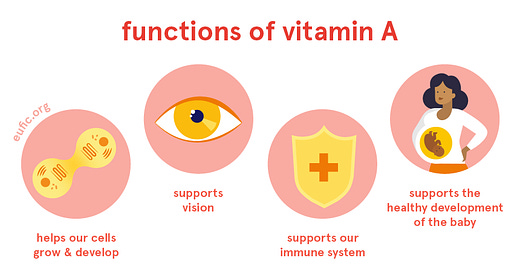What is Vitamin A ? Why is it beneficial to the aging process?
Vitamin A, a fat-soluble vitamin, plays a crucial role in various physiological processes and has several potential benefits related to aging. However, it's important to note that the effects of vitamin A on aging can vary depending on the specific context and individual circumstances. Here are some evidenced-based medicinal advantages of vitamin A in relation to aging:
Skin Health: Vitamin A is essential for maintaining healthy skin. It promotes the production and maintenance of skin cells, and it is commonly used in topical treatments for conditions such as acne and psoriasis. Retinoids, which are derivatives of vitamin A, have been shown to improve the appearance of fine lines and wrinkles, enhance skin texture, and reduce age spots.
Vision: Vitamin A is critical for maintaining good vision, particularly in low-light conditions. It is a component of the visual pigment rhodopsin, which is necessary for the functioning of the retina. Adequate vitamin A intake can help reduce the risk of age-related macular degeneration (AMD), a leading cause of vision loss in older adults.
Immune Function: Vitamin A plays a vital role in supporting the immune system. It helps maintain the integrity of the skin and mucous membranes, which act as barriers against pathogens. Additionally, vitamin A is involved in the production and function of white blood cells, including lymphocytes and macrophages, which are important for immune responses.
Bone Health: Some evidence suggests that vitamin A may contribute to bone health and the prevention of osteoporosis. It aids in the regulation of bone remodeling by influencing the activity of cells called osteoblasts and osteoclasts. However, excessive intake of vitamin A can have adverse effects on bone health, so it is important to maintain a balanced intake.
It's worth noting that while vitamin A offers potential benefits, excessive intake can be harmful. High doses of vitamin A, either from supplements or certain medications, can lead to toxicity and adverse effects. It is always recommended to consult with a healthcare professional or a registered dietitian for personalized advice on vitamin A intake and any potential supplements for specific health concerns.
Excessive use of vitamin A, either through high-dose supplementation or chronic consumption of foods rich in preformed vitamin A (retinol), can lead to a condition known as hypervitaminosis A. Here are some evidenced-based harmful effects associated with excessive use of vitamin A:
Acute Toxicity: Acute toxicity occurs when extremely high doses of vitamin A are consumed within a short period. Symptoms may include nausea, vomiting, dizziness, headache, blurred vision, and even coma in severe cases.
Chronic Toxicity: Chronic toxicity can result from long-term consumption of excessive amounts of vitamin A. It can cause a range of adverse effects, such as dry and itchy skin, hair loss, bone and joint pain, fatigue, irritability, loss of appetite, and liver damage.
Teratogenicity: Pregnant women should be cautious about excessive vitamin A intake as it can pose a risk to the developing fetus. High levels of vitamin A during pregnancy have been associated with an increased risk of birth defects, particularly affecting the development of the central nervous system, heart, and limbs.
Bone Health Concerns: While vitamin A is important for bone health in appropriate amounts, excessive intake can have negative effects. Excessive vitamin A has been associated with an increased risk of osteoporosis and bone fractures.
It's important to note that these harmful effects are typically associated with high-dose vitamin A supplementation or the consumption of animal-based sources of vitamin A (retinol) in large quantities. Beta-carotene, a precursor to vitamin A found in plant-based foods, does not typically cause toxicity as the body converts it to vitamin A as needed and eliminates any excess.
To ensure safety, it's recommended to follow the recommended dietary allowances (RDAs) for vitamin A and consult with a healthcare professional or a registered dietitian for personalized advice on supplementation and dietary intake based on individual needs and health conditions.





